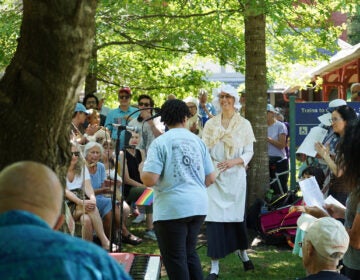Learning, growing as essential to gratifying work

(Business meeting image courtesy of Shutterstock.com)
A big part of being human at work is bringing many of your normal needs into the workplace in a reasonable way. Even if we hone particular skills in a work context, they usually require parts of ourselves that aren’t relegated solely to the workplace. We learn about ourselves. And, in the learning, we grow.
“The Lord God has given me the tongue of a teacher,that I may know how to sustain the weary with a word.Morning by morning he wakens —Wakens my ear to listen as those who are taught.”—Isaiah 50:4
This passage from the Hebrew prophetic writings of Isaiah has always caught my ear. In wise beauty, characteristic of the Hebrew holy writings, it holds the relationships between what we learn and how we teach what we’ve learned — and that, when it’s real, it’s never just output; it’s always a circle.
‘Learning is the thing for you.’
A big part of being human at work is bringing many of your normal needs into the workplace in a reasonable way — for instance, the need most of us have for some processing time during the day or work that reflects what we love doing. And for most of us in the workplace, as in life, we have a normal need to grow and learn.
That’s one of the places where work and life become a little less compartmentalized. When I learn on the job, it’s like what design teacher Andrew Phillips described: “I learn about myself, urban issues, spirituality, work.”
Even if we identify particular skills that we hone mainly in a work context — how to teach design techniques, ways to promote classroom discussion, technical manipulation for photographers, vocal techniques for performers, medical procedures for doctors, case law for attorneys — they usually require parts of ourselves, like empathy, memory, technical aptitude, that aren’t relegated solely to the workplace.
We learn about ourselves. And, in the learning, we grow. In turn, we offer what we’ve learned to others, and every time we do, we have the chance to see it differently through someone else’s eyes.
Old wisdom, radical business
It’s wisdom we may see in ancient holy writings like Isaiah, and it’s wisdom identified by studies in the Harvard Business Review. In a 2014 article “Does Your Company Make You a Better Person?” the authors identify organizations they refer to as “deliberately developmental organizations.” These DDOs see the idea of a work/life trade-off as a false distinction, quoting one executive as saying “If work and life are separate things — if work is what keeps you from living — then we’ve got a serious problem.”
So the authors flip the ideas around. What if the personal development of employees — not just through one-off seminars and exterior consultants, but through consistently daily support with their growing edges — was seen as core to a company’s success?
The answer is a radically productive and prosperous company based on people not having to cover up their weak spots or places they haven’t yet succeeded but seeing those very places as where the company supports their growth.
“Imagine showing up to work each day knowing that, in addition to working on projects, problems, and products, you are constantly working on yourself,” the authors write. “Any meeting may be a context in which you are asked to keep making progress on overcoming your own blindspots — ways you are prone to get in your own way and unwittingly limit your own effectiveness at work.”
It may seem radical compared with traditional business strategies, but it aligns well with our older wisdom traditions. As wisdom writer Parker Palmer has recently written, questions like “What’s life trying to teach me here” help him find meaning in “apparently meaningless situations.”
Palmer closes with a quotation from T.H. White’s novel The Once and Future King, when the sage Merlyn is training the future king.
“The best thing for being sad,” replied Merlyn, “is to learn something. That is the only thing that never fails. You may grow old and trembling in your anatomies, you may lie awake at night listening to the disorder of your veins, you may miss your only love, you may see the world around you devastated by evil lunatics, or know your honor trampled in the sewers of baser minds. There is only one thing for it then — to learn. Learn why the world wags and what wags it. That is the only thing which the mind can never exhaust, never alienate, never be tortured by, never fear or distrust, and never dream of regretting. Learning is the thing for you.”
WHYY is your source for fact-based, in-depth journalism and information. As a nonprofit organization, we rely on financial support from readers like you. Please give today.




